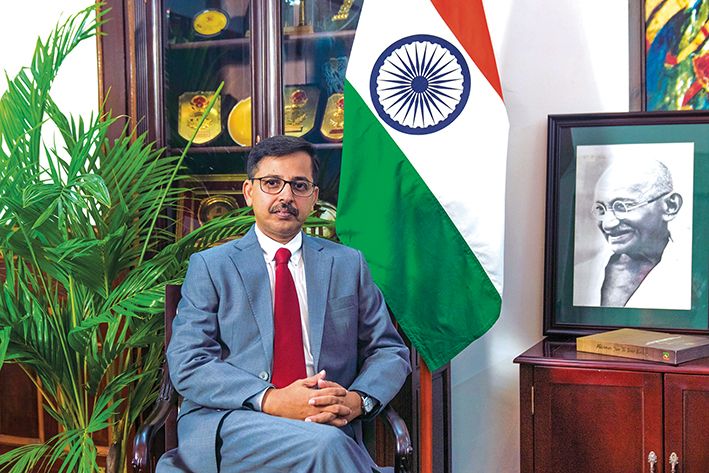
For Vietnamese version, please read here.
Q1. The year 2019 ended with great news about Vietnam-India relations: the inauguration of Hanoi-New Delhi direct flights. This is the result of the two countries efforts after a long time, so there must be "a whole story" behind it. Can Ambassador uncover the "secrets" to our readers?
The launch of direct flights is a significant development in India-Vietnam relations in 2019. Lack of direct connectivity has always kept our engagement from reaching its full potential. There have been MOUs and agreements signed in the recent past between our two countries for direct air services and both sides have worked hard to realize this dream. We are very happy that these efforts have borne fruits. We are confident that the two new direct flights linking Hanoi and Ho Chi Minh City with Delhi and Kolkata will give a boost to tourism exchanges between India and Vietnam and bring our peoples closer together. We are also hopeful that these convenient direct connections, which considerably shorten the travel time, will encourage businesses on both sides to work on their complementarities and push the level of our economic ties.
Q2. The direct flights will open new opportunities for Vietnam-India relations. What are your upcoming plans to enhance this Comprehensive Strategic Partnership?
As I said, the new direct flights will bring a whole range of new opportunities for both our countries. Most importantly, they will promote people-to-people contacts, which is the most important component of relations between any two countries. Promoting closer tourism ties and people-to-people exchanges between our two countries is an important priority for us in 2020.
In addition, we would like to deepen our trade and investment ties. Vietnam is the fourth largest trading partner of India in the ASEAN region. There are sizeable Indian investments in Vietnam. However, given the size and rapid growth of our economies, there is so much untapped potential.
Our development partnership through capacity building programmes and development projects, which has a long history, is another important area of our engagement. We would like to further enhance this cooperation.
We also look forward to further deepening our defence partnership, which has today diversified to newer areas such as defence industry and technology cooperation.
We also look forward to greater engagement between India and Vietnam in practical cooperation under the rubric of our Indo-Pacific vision.
Q3. Are there any challenges in Vietnam-India relations that we need to overcome?
Vietnam is one of India’s most trusted friends and closest partners. As Comprehensive Strategic Partners, there is a wide range of areas in which we are cooperating – ranging from political engagement to trade and investment ties, energy cooperation, development partnership, defence and security cooperation, cultural and people-to-people exchanges. Our challenge is to maintain the momentum of these diverse engagements and constantly strive to bring them to higher levels.
Q4. Vietnam will assume its twin role in 2020: Chair of ASEAN and non-permanent member of the UNSC 2020-2021. What is India's expectation in Vietnam's roles and why?
Vietnam is a key pillar of India’s Act East Policy and an important partner in India’s Indo-Pacific Vision. Our bilateral ties are based on strong mutual trust and understanding, and on strong convergence of views on various regional and international issues.
As a close friend, we are happy to see Vietnam simultaneously assuming the leadership of ASEAN and the membership of the UN Security Council. Vietnam has always played the role of an active and responsible member of the international community by making contributions in diverse areas such as UN peacekeeping, sustainable development goals, promotion of multilateralism etc. The new responsibilities will provide an important platform for Vietnam to make further contributions to global and regional peace, stability and development.
India stands ready and looks forward to work closely with Vietnam to help it fully realize the objectives of its twin responsibilities as the chairman of ASEAN and Member of UN Security Council.
Q5. You will celebrate your first Tet in Vietnam. Can you please share your plans, how will you celebrate Tet?
Tet is the most important festival for the people of Vietnam marking the lunar New Year and celebrated not just all over Vietnam but also by the Vietnamese community living abroad. As the date of the festival draws closer, we have already started feeling the festive atmosphere. I feel that Tet is an important occasion for the people of Vietnam and all of us who live in Vietnam, to remember the importance of cultural traditions and values of family get-together and social bonding.
This is the first time I will be in Vietnam during the festival of Tet. I look forward to celebrating it with my Vietnamese colleagues and friends.
On this festive occasion, I would like to convey to the people of Vietnam my warmest greeting for the Tet Festival and a very happy and prosperous New Year. I also hope that in the New Year, the close bonds of friendship between the people of India and Vietnam will become even stronger. Chúc M?ng N?m M?i!
Q6. Around 40% of Indian trade goes through the South China Sea. What is India’s perspective on recent disputes in this region? And India and Vietnam cooperation in this region (if any)?
India’s position on the South China Sea issue is clear and consistent and has been articulated on several occasions in the past. South China Sea is an important international waterway. India, therefore, has an abiding interest in the peace and stability of the region. India firmly stands for the freedom of navigation and overflight, and unimpeded lawful commerce, in the international waters in accordance with international laws, notably the UNCLOS. India also believes that any differences must be resolved peacefully by respecting legal and diplomatic processes and without resorting to threat or use of force. India stands ready to work with international partners, including Vietnam, to maintain and promote peace, stability and development in the Indo-Pacific region.
*****










